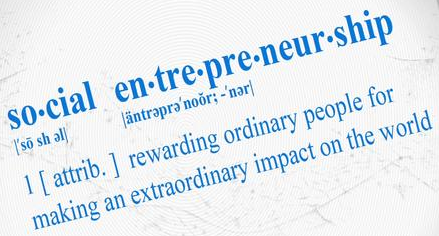What Is Social Entrepreneurship


The concept of Social Entrepreneurship has gained momentum and increasing attention in the academic, business and civil society in Africa, over the last few years. The term first found prominence in the US as non-profits began to look at ways of generating income to become more sustainable. The movement then spread to Europe with their long history of co-operatives and social businesses started talking in terms of ‘social entrepreneurship’.
The global social entrepreneurship sector is now well developed with universities developing social entrepreneurship programmes, a growing body of research on the topic, national and international conferences taking place and support structures and services being developed. Funders, philanthropists and impact investors are engaging with the field and developing finance products to serve the sector.
There are a range of different definitions used when describing a social entrepreneur. The Schwab Foundation, a global organisation dedicated to raising the profile of social entrepreneurship, describes a social entrepreneur as being:
“Someone who builds strong and sustainable organisations, which are either set up as not-for-profit or companies.”
A similar organisation, Ashoka, who identify and invest in leading social entrepreneurs across the globe, use the following definition:
“Social Entrepreneurs are individuals with innovative solutions to society’s most pressing social problems.”
When talking about social entrepreneurs we often use the term ‘social enterprise’ to refer to the organisations social entrepreneurs have established to put their innovations into practice. In its broadest sense social enterprise can refer to small community enterprises, co-operatives, NGOs using income generating strategies to become more sustainable, social businesses or companies that are driven by their desire to bring social or environmental change.
The elements that are common to the majority of definitions of a social enterprise are that it will:
generate income through trading activities, it may also receive funding, but it’s core activity is selling goods or services
have its social or environmental purpose at the centre of what it does, its social or environmental purpose is not an add-on such as a CSI project undertaken by a corporate organisation
use innovative approaches to achieve its social or environmental impact
re-invest its surplus back into achieving its social and environmental purpose – the more surplus it makes, the more impact it can have, some structures allow for a capped dividend for investors or co-operative members in order to attract investment or commitment from members
be transparent and engage its stakeholders at every level
The Schwab Foundation defines a social enterprise as being:
“… an organization that achieves large scale, systemic and sustainable social change through a new invention, a different approach, a more rigorous application of known technologies, or a combination of these.”
The International Labor Organization (ILO), who were instrumental in leading the work on social enterprise in South Africa, uses the following definition:
“Social Enterprises differ from conventional enterprises in that social impact is considered as more important than maximizing profits.”




